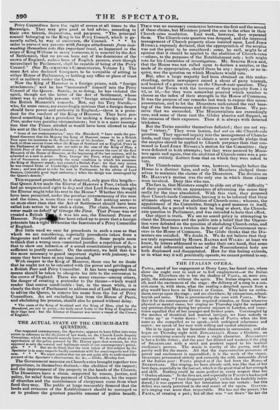THE ACTUAL STATE OF THE CHURCH-RATE QUESTION.
Our respected contemporary, the Spectator, appears to have fallen into some errors in reference to the divisions of last week, on the Church Lands Inquiry Committee, which we should scarcely have expected. We do not allude to his approbation of the policy pursued by Mr. Harvey upon that occasion, for this approval is only the natural and legitimate result of our contemporary's princi- ples. ŌĆó ŌĆó ŌĆó But we do think that the view taken of this subject by the Spectator is in some respects hardly consistent with his usual sagacity and fair- ness. ŌĆó ŌĆó ŌĆó We must confess that we are not quite able to understand the purport of the Spectator's observations, &c. &c.ŌĆö Globe, Monday last.
The Government measure on Church-rates brought together two propositions, in themselves distinct,ŌĆöthe abolition of the impost; and the improvement of the property in the hands of the Church. The Dissenters have a claim, supported by reason, justice, and policy, for relief from the payment of Church-rates, let the repair of churches and the maintenance of clergymen come from what fund they may. The public at large reasonably demand that the lands and revenues of the Establishment should be managed so as to produce the greatest possible amount of public benefit.
There was no necessary connexion between the first and the second of these claims, but Ministers joined the one to the other in their Church. rates resolution. Last week, however, they separated them. The Church-rate question was dropped, and the improved management of Church property alone insisted upon. Lord Josue RUSSELL expressly declared, that the appropriation of the surplus was not the point to be considered : some, he said, might be of opinion that it should be applied to the abolition of Church-rates ŌĆöothers, to the purposes of the Establishment only ; both might vote for his Committee of. investigation. Mr. SPRING RICE said,. that the House was not called upon to declare a surplus, or the. mode of its appropriation, should there be any : inquiry, or no in- quiry, was the question on which Members would vote.
But, after a large majority had been obtained on this under. standing, certain newspapers raised a shout of party triumph, and boasted of a great victory on the Church-rate question. They taunted the Tories with the increase of their majority from 3 to 83, or 26,ŌĆöfor they were somewhat puzzled which number to. choose as the index of their strength in the House of Commons. It was the purpose of our remarks last week to expose this misre- presentation, and to let the Dissenters understand the real bear- ing of the late discussions and divisions in the House. We per- ceive that we succeeded. The Ministerialists are exceedingly sore, and some of them (not the Globe) abusive and flippant, on the occasion of their exposure. Thus it is always with detected tricksters.
But the Tories consider themselves defeated ; they are not cry- ing " victory." They were beaten, but not on the Church-rate question. They opposed inquiry into the management of Church- lands, and they endeavoured to obtain a more specific pledge that the surplus should be applied to Church purposes than that con- tained in Lord JOHN RUSSELL'S motion for the Committee : they were defeated in both attempts; but they were assured by Minis- ters again and again, that the abolition of Church-rates was a pro- position entirely distinct from that on which they were asked to vote.
The Church-rates question was, however, brought before the House in a distinct form, and only 58 Members pledged them- selves to maintain the claims of the Dissenters. The division on Mr. HARVEY'S motion was the only one in which those claims were involved. Deny this who can.
The fact is, that Ministers sought to slide out of the "difficulty of' their position with an appearance of advancing the cause they really for the time abandoned. With this view, they proposed their Church-lands Committee, leaving it to be inferred that their ultimate object was the abolition of Church.rates ; whereas, the appointment of the Committee, though a good measure in itself, cushioned, for a period which may be long or short, the Church- rate question in Parliament, and was intended to have that effect. Our object is truth. We see no sound policy in attempting to cheat the Dissenters and the public into a belief that the Opposi- tion were defeated on the question of abolishing Church-rates, and that there had been a reaction in favour of the Government mea- sure in the House of Commons. The Globe thinks that the Dis- senters are satisfied. We doubt it. We do not believe that they are truly represented by Messrs. BAINES and WiLKs : at least we know, by letters addressed to us under their own hand, that some active and influential members of the Nonconformist body are both displeased and disappointed. How far this feeling extends, or in what way it will practically operate, we cannot pretend to say.


























 Previous page
Previous page